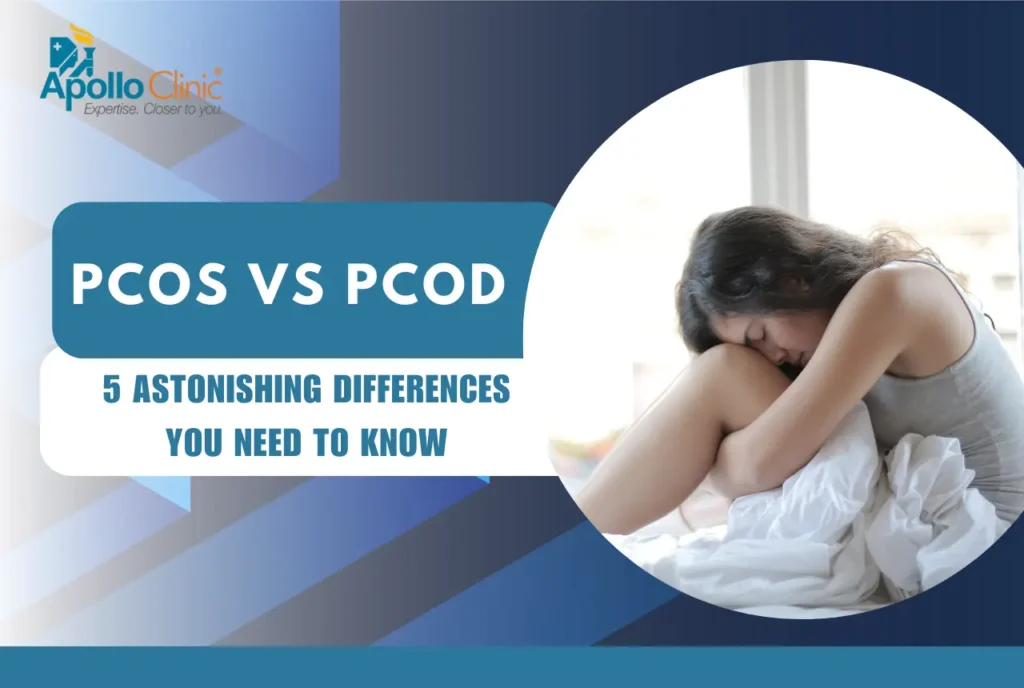5 Astonishing Differences Between PCOS and PCOD You Need to Know
What is the difference between PCOS and PCOD, and how does that affect your health?
Do you ever feel confused by these two terms? Well, you are not alone. While they share similar names and overlapping symptoms, PCOS and PCOD are categorized separately with distinct characteristics. This is what may get the right diagnosis and treatment.
PCOS vs PCOD: Five key differences as a concerned citizen, you must have stumbled upon many terms connecting to an individual’s health issues. These could be confusing, especially for the commoner, as not all have a tight grip on medical terminologies. In this article, we will delve into five important differences between PCOS and PCOD, once you finish reading it, you will know about the causes and symptoms, complications, and management of these two conditions.
Understanding the Difference Between PCOS and PCOD

PCOS is a hormonal disorder that affects many different women’s bodily system functions, especially the reproductive system. Experts estimate that 6-12% of women in the reproductive age group suffer from this disorder, which might manifest with irregular menstrual cycles, weight gain, or other fertility-related issues. On the contrary, PCOD is typically a less severe condition than PCOS as well because multiple cysts in the ovaries form without the more overarching metabolic problems seen with PCOS.
Most people mistake PCOS and PCOD as one and the same thing. However, both have some similarities, such as irregular periods and ovarian cysts; still, the underlying mechanism of the two differs greatly. An example would be that women with PCOS are more prone to conditions like diabetes and heart disease because of their insulin resistance, which is not the case with PCOD, which rarely leads to such metabolic disorders.
It’s important to understand this because it’s going to help people get the right diagnosis and the right care for their specific situation. For example, one woman may need to track her insulin levels carefully if she has PCOS; whereas, PCOD does not necessarily provide the same kind of metabolic stress.
What are the 5 Major Differences Between PCOS and PCOD
1. Nature of the Condition

PCOS is considered an endocrine disorder that throws widespread metabolic effects on the body systems, rather than just on the ovaries. It is a disorder mainly caused by hormonal imbalance, leading to severe health issues that can be followed by insulin resistance, obesity, and increased risks of diabetes and cardiovascular diseases.
Conversely, PCOD is primarily termed as an ovarian condition in which multiple cysts have been formed due to hormonal imbalances but lacks the widely systemic implications seen in PCOS.
These two conditions share such similarities in the fact that both of them entail the formation of cysts within the ovaries; however, PCOS would be much worse because it is the kind of condition that is complicated in nature and deals with hormonal and metabolic conditions. Women diagnosed with PCOS usually get affected by different signs that reach everyday life, thus requiring a whole approach to the treatment process.
2. Hormonal Imbalance

In PCOS, there is exaggerated production of androgens commonly known as male hormones, leading to symptoms such as hirsutism which is excessive hair growth, acne, and irregular periods. This overproduction is much more frequently related to a state of insulin resistance where the cells of the body do not respond appropriately to insulin. This interplay places high levels of insulin and androgens at risk of developing type 2 diabetes and cardiovascular conditions in PCOS women.
On the other hand, PCOD usually presents with milder forms of hormone disorder. Even though the cases with PCOD may also have some level of hormonal imbalance, in most cases, their androgen levels are normal. This leads to many differences in terms of both symptoms and health risks between one and the other condition.
3. Impact on Fertility

Polycystic Ovary Syndrome (PCOS) highly impacts fertility since most women develop ovulatory dysfunction as a result of hormonal imbalance. Disruptions associated with PCOS usually therefore lead to infertility, making it one of the main causes of infertility among women. Treatment in PCOS varies from more aggressive treatments; this may involve Clomid or Metformin or assisted reproductive technologies like IVF in a bid to stimulate ovulation with a view to bettering conception chances.
Whereas PCOD can have normal ovulation, hence, females suffering from this condition can get pregnant only with some delay. Treatment for fertility in a case of PCOD is relatively not a complex issue and encompasses only lifestyle and medicines like Clomid that induce ovulation. Although both may cause infertility, both conditions manifest differently and vary to a large extent in terms of treatment needed. An accurate diagnosis forms an important aspect of adjusting the appropriate management strategies.
4. Health Complications

Long-term health complications are more likely to occur with PCOS than in the case of PCOD. The hormonal imbalance, such as in PCOS, places women at risk for serious diseases. These risks include heart disease, endometrial cancer, and type 2 diabetes. Because these are caused by metabolic effects and hormonal imbalances, chronic insulin resistance in PCOS can exacerbate those risks with further implications over time.
On the other hand, PCOD presents more generally milder risks that can often be managed through lifestyle adjustments such as diet and exercise. While women with PCOD suffer some level of hormonal disruption and related symptomatology, the long-term health implications are often less severe than those linked with PCOS. Therefore, this indicates the importance of early diagnosis and proactive management to control any potential threat to health.
5. Treatment Approach

Treatment for PCOS and PCOD is two different things mainly because of the nature and severity level of the conditions. PCOS usually requires long-term management, which may include medication treatment, such as Metformin, to control insulin resistance, followed by hormonal therapy to normalize the menstrual cycle.
Lifestyle modification, such as weight management and exercise, is also part of the treatment protocol.
On the contrary, PCOS is mostly treated with less aggressive interventions targeted towards simple lifestyle modifications such as diet and exercise. Surgical intervention is rarely required except in the case of fertility drugs like Clomid.
Early diagnosis is very important while making differential treatment plans for both conditions. Therefore, the treatment of a woman who is suffering from PCOS should comprise all aspects of the condition, whereas a woman with PCOD may be treated with specific lifestyle modifications to improve her condition up to a certain extent.
Common Symptoms and Overlapping Characteristics

Both conditions the conditions namely, Polycystic Ovary Syndrome (PCOS) and Polycystic Ovarian Disease (PCOD) share very common symptoms including:
- Irregular Periods: In both conditions, many women have irregular periods or infrequent and rare menstruation.
- Weight Gain: Weight gain accompanies both disorders and is central or abdominal in location, thereby contributing to further disturbance of hormonal levels.
- Ovarian Cysts: There are multiple cysts on the ovaries in both PCOS and PCOD.
This overlap in symptoms may often cause confusion at the time of diagnosis since many providers initially treat the two diseases interchangeably. However, knowing the sources or root causes such as the more serious hormonal imbalances and metabolic disturbances of PCOS may help distinguish the two conditions.
Accurate diagnosis becomes imperative for effective treatment management since management strategies for the two diseases differ dramatically depending on whether a patient suffers from PCOS or PCOD.
Lifestyle and Management Tips for PCOS and PCOD

Controlling PCOS and PCOD efficiently requires the following lifestyle tips:
- Maintain Healthy Weight: Losing as little as 5 percent of body weight may regulate menstrual cycles and improve the body’s sensitivity to insulin.
- Exercise Regularly: Engage in at least 150 minutes of moderate exercise per week to manage weight and maintain metabolic health.
- Dietary changes: Increase their intake of balanced, wholesome diets that are healthy fats, low GI, and protein-rich which will, in turn, regulate the sugars in the blood.
- Stress Management: Encourage them to take up stress-reducing activities such as yoga, meditation, and deep breathing exercises for their hormonal regulation.
Another aspect is medical intervention. Consult your doctors for adequate treatment to incorporate drugs or supplements if lifestyle change alone will not do. Often, more frequent visits are required to monitor the health condition and treatment changes on a regular basis.
Conclusion
In conclusion, understanding the difference between PCOS and PCOD is crucial for effective management and better health outcomes. PCOS is typically more serious and is associated with a higher risk of diabetes, whereas PCOD usually is not so complicated to treat. With this difference, it will be possible to make decisions in health.
If you find you are experiencing symptoms like irregular periods, weight gain, or difficulty with your fertility, then head on to a healthcare provider so that you can know which condition you have. A customized diagnosis and treatment plan are therefore of the utmost importance in dealing with symptoms and living healthily for the rest of your life.


